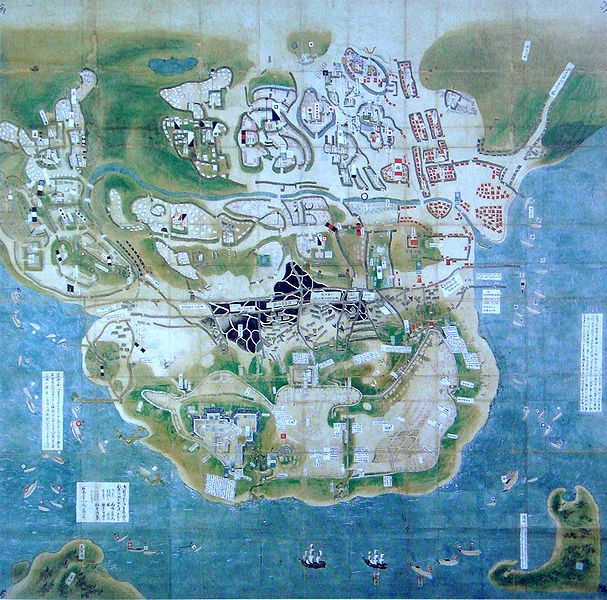
(source: NL, anti-Putin demonstration in Moscow)
If you’re wondering what Doby has to do with anything, look at this face:

Oh, sorry, wrong one. I meant this:

Oh no, sorry. I am really confusing my totalitarian right-wingers today. I meant this:









On July 13th, 1941, coming from Pesets district, Red Army soldier Ovcharenko was delivering ammunition for 3rd Machine-Gun Company, being four-five kilometres from the division.
Ovcharenko was attacked and surrounded by fifty German soldiers and three officers on two motor vehicles.
A German officer left the car, ordered Ovcharenko to lift hands up, beat the rifle from his hands and began to interrogate him. In the vehicle's trunk, Ovcharenko had an ax. Without losing spirit, he beheaded the German officer with the ax and threw three grenades at the German car.
Twenty one German soldiers were killed; others ran away in panic. Ovcharenko pursued a wounded officer with an ax in his hands. In the town Pesets, he caught up with the officer in a garden and decapitated him. Third officer managed to disappear.
Without losing initiative, comrade Ovcharenko took documents from all the killed soldiers, maps from the officers, schematics and records and presented them to the regiment headquarters.
The vehicle with supplies and products was delivered on time to his company. Comrade Ovcharenko continues his military life. He was raised to a machine gunner.
— Commander of the Southern Front, General-Lieutenant Ryabyshev. Member of the Military Council, Korniets.I do have one question. I know it probably did not escape other people's attention, but I just have to ask it. What happened between the "hands up, beat the rifle out of hands, interrogation" part and "got an ax from the trunk of the car and decapitated the German officer"? Is it just me, or is there a step missing there? Like: "Umm... Headquarters? Wait a second. Umm. I actually have a map to Stalin's headquarters in my trunk. Yeah. Just one sec... just stand there... just... whatchuhgot!.. slash..."
On the other hand, the situation is the same as in Republican primaries: all of the candidates suck, with the exception of Ron Paul. Choosing between these parties is like choosing between two weevils.
I remember how my rabbi's father explained the difference between Catholic and Protestant church: when you're riding in a horse-driven cart, sometimes the horse does its business on the road. And sometimes the wheel drives through the horse's present and divides it in two. Now, what's the difference between the right half and the left half? That's basically the difference between Newt and Romney, between Communists and Putin in Russia, and between Democrats and Republicans in the US.An illustration of this concept:


If slavery wasn’t abolished, women wouldn’t be able to vote, we wouldn’t have things such as the refrigerator, and women wouldn’t be able to work.(source)



Texas: 47thBut, for 2009 4th Grade Math:
Wisconsin: 2nd
White students: Texas 254, Wisconsin 250 (national average 248)For other grades and disciplines, it's the same: Texas scores consistently higher than WI and national average, while WI scores just barely above (and oftentimes below) than the national average. See for yourself.
Black students: Texas 231, Wisconsin 217 (national 222)
Hispanic students: Texas 233, Wisconsin 228 (national 227)

Each spring sees the opening of another baseball season. This is one of my favorite spectator sports, but every year there is one thing that bothers me about it. That is the way that semi-professional, university, and sometimes even highschool stars enter the professional leagues and immediately display a skill that puts their veteran teammates to shame.
There hardly seems to be any difference at all between amateurs and professionals. Amateurs play for pure enjoyment, while professionals play to make a living. The difference between them ought to be much greater.
In every confrontation with a real American professional team it seems that what we need to learn from them, besides their technique of course, is how uniformly faithful their players are to the fundamentals. Faithfulness to fundamentals seems to be a common thread linking professionalism in all areas. If we consider the American professionals as the real professionals in baseball, then I think we have to consider their Japanese counterparts, who tend to pass over the fundamentals, as nothing more than advanced amateurs.
The reason for the lack of polish in Japanese baseball is probably just the short history it has in this country. Each year, when the visiting American team makes its tour, I sense an improvement on the Japanese side, so that in another few decades, or another century perhaps, when the necessary progress in technique and mental attitude has been made, I expect to see a world championship spanning the Pacific. I feel certain that no racial physical inferiority consigns us to second place.
The opposite case, where the difference between amateur and professional is most striking, is Japanese sumo wrestling. There even the collegiate grand champion has to enter the professional ranks in the third division down from the top and work his way up while being treated like any other raw recruit. Collegiate wrestlers lack nothing in body, weight, or strength, and they are gifted with the advantage of intelligence. The potential is there, all right, but on the other side there seems to be what can only be termed a thick barrier between amateur and professional, built by a long tradition among professionals of almost superhuman effort. It takes more than just bodily size and strength to become a professional sumo wrestler.
In the world of go also, a long tradition of intellectual combat has distilled the professional into something that an amateur can never hope to become. A professional has undergone elite training in competition from childhood; he has learned to view every other person as an opponent to be beaten down and crushed. His mental, physical, and emotional strength all have to be fully developed. If he lets up anywhere, it will show in his performance on the board and he will fail the professional test. The realm of competition is stark.
No professional regrets the time he has had to spend studying. "I've never spent a minute studying in my life," declares Yamabe, 9-dan. Let two professionals get into a post game analysis, however, and they will go on endlessly, completely forgetting about time. Who will say that is not studying?
The way young players have taken over the game can only be called terrifying. The time they spend studying every day defies the imagination.
Professionals do this unquestioningly. Even a gemstone has to be polished. "A man is always moving either forward or backward," says Kano, 9-dan. "He never stands still." This should be every go player's motto, and he should keep piling effort on top of effort no matter what his age. He can be confident of always making progress.And now, a lecture from Dywin on orthodox opening (make sure to increase the quality to at least 480p):

Eddie: They're armed.
Soap: What was that? Armed? What do you mean, armed? Armed with what?
Eddie: Err, bad breath, colorful language, feather duster... what do you think they're gonna be armed with? Guns, you [moron]!
When the world relied on whales as a source of hydrocarbons, they were too expensive to use as fuels, and the demand was self-limiting.
When the whales were “saved” by petrochemical industry, it was only a short respite. Petrol-powered machinery required new types of lubricants that increased rather than decreased the reliance on sperm oil. Petroleum was plentiful, the cars filled the world, and it is at that point that the whales began to disappear.
Literally nothing was done to save these whales until the cars evolved to the point when the engines started to operate at a higher temperature; the latter was caused by the concern about human health and efficiency rather than the well being of these whales. The environmental activists drove their cars just like everyone else, and they consumed transported goods and benefitted from sperm oil based lubricants in a myriad other ways, sustaining the demand. It was not their attention grabbing activities that stopped killing whales, but the unsung efforts of chemists finding a synthetic replacement to sperm oil.
Meanwhile, human lives were lost through multiple transmission failures.Also, from the comments:
The reason why so many whales were killed in the 20th century was the distant ramifications of replacement of whale oil by petroleum. It took another 100 years to find solutions to these ramifications, and only then it became possible to save the whales. Ecological activism did not play significant role in all of these developments; neither did the numerous well-meaning international treaties, moratoriums, and other chest beating displays.
A chemist who saved the whales has not merited a Wikipedia entry. His name was P. S. Landis and he was a researcher at Mobile Oil.
We still have the national strategic whale oil reserve, and if you badly need it (and can prove that to the US government), you can obtain it from there. I've heard that the gears in the Hubble Telescope were lubricated with sperm oil, though I do not know if this is true. For applications at low temperature it remains unsurpassed. BTW, it still remains unknown what makes it such an exceptional lubricant, there are only theories.
By the 31st century, no fossil fuels will be left in the ground, so we'll be back to recycling atmospheric CO2 in the sustainable, socially responsible way, of which whale harvesting is an example. The Futurama guys get it right.I personally think that if there is one thing that the governments are useful for is to protect the intelligent beings that cannot protect themselves (against humans). That includes old ladies and sperm whales.



When, as a young boy, Sholom DovBer of Lubavitch learned [the verse “G-d appeared to him”], he came in tears to his grandfather, Rabbi Menachem Mendel of Lubavitch (the Tzemach Tzedek), and cried, “If G-d appeared to Abraham, why doesn’t He appear to me, as well?” In reply to his little grandson’s anguished question, the Tzemach Tzedek told him that Abraham merited having G-d appear to him because, although he had indeed refined himself enough to attain very sublime levels of Divine consciousness, he at the same time knew that G-d is infinite and that therefore there were still an infinite number of levels of Divine consciousness to attain. This recognition left Abraham feeling grossly inadequate, as though he were still encrusted by layers of insensitivity to Divine awareness that needed to be removed — to be “circumcised” — in order to bare his heart before his Creator.So, we see a gradual progression of Avraham’s understanding of G-d’s nature. He started with definition of G-d as a creator. Then he progressed to understanding of G-d as one who does kindness, chessed — from the “right” pillar of the kabbalistic tree of Divine Attributes. After his circumcision, Avraham achieved a level of being able to see the whole tree, with left side present. He was able to perceived that G-d is also a judge (as can be seen from his arguing with G-d about destruction of the Cities of the Plane: “Shall the Judge of the whole world not judge fairly?”). Birth of Yitzchok pushed the definition even further: not only was G-d the source of the world’s order, of Nature, but He was able to do miracles, transcending definitions of natural laws.


The number of go tournaments held in Japan during World War II were far fewer than those held before the war. Many young players were being drafted into military service and, because of a paper shortage, newspapers were compelled to reduce their size. Go columns were among the first to be dropped. In spite of this, newspapers continued to sponsor tournaments and games, even though they would probably never be published.
As the war dragged on, conditions for staging even the most important games became extremely difficult. In the spring of 1945, Kaoru Iwamoto, 7-dan, earned the right to challenge Hashimoto Utaro for the third Honinbo title. However, finding a venue for the title match in bombed-out Tokyo had become impossible.
A venue for the games was finally found in Hiroshima. However, the police chief of the city, who was an amateur go player, ordered the players not to play there, since it was too dangerous. However, when the police chief was called away on official business, the players, taking advantage of his absence, ignored his order and played the first game of the match July 23-25 under a rain of bullets from strafing airplanes.
When the chief returned and heard that a game had been played, he was furious and fabade players in no uncertain terms from playing any more games in Hiroshima.
Another venue was found in Itsukaichi, an outer suburb of Hiroshima, and the second game was played there Aug. 4-6.
On the morning of Aug. 6, Hashimoto happened to be in the garden when the atomic bomb was dropped. He saw a brilliant flash of light and the mushroom cloud rise above the city. A tremendous blast of wind shattered all the windows and turned the playing room into a shambles. The position on the board had to be set up again. Under these circumstances, they managed to complete the game; Hashimoto won by five points.
That evening, atomic-bomb survivors started to pour into Itsukaichi and the players began to understand the magnitude of the disaster and just how lucky they were. The house in which they were to have played their game was destroyed and its owner killed.
The war ended a week later and the match was resumed in November, ending in a 3-3 tie. A playoff became necessary, but Japan was in such disarray that it was not until July 1946 that a best-of-three playoff was arranged. Iwamoto won the first two games, and thereby took the Honinbo title.
Hashimoto and Iwamoto were important forces in the go world during the years following the war. Had they been killed in Hiroshima that fateful day, the history of go today would most likely be quite different.
Iwamoto defended the Honinbo title against Minoru Kitani in 1947, but Hashimoto came back in 1959 to recapture it. Then, with the prestige of holding the top title in the go world at that time, Hashimoto broke away from the Japan Go Association and formed the Western Japan Go Association. Although, a bitter rivalry existed between these two organizations for a while, they coexist amicably today and cooperate on many levels to promote go in Japan.
Iwamoto, who will be 97 on Feb. 5, has contributed much to the popularization of go in the West. In 1929, he retired as a go player and immigrated to Brazil. However, two years later he returned to Japan and resumed his go-playing career. Perhaps it was this experience that caused him to want to make go a truly international game. He has gone on numerous overseas tours and has established go centers in Amsterdam, Sao Paulo, Seattle and New York.
Let me say only this much to the moral issue involved: Suppose Germany had developed two bombs before we had any bombs. And suppose Germany had dropped one bomb, say, on Rochester and the other on Buffalo, and then having run out of bombs she would have lost the war. Can anyone doubt that we would then have defined the dropping of atomic bombs on cities as a war crime, and that we would have sentenced the Germans who were guilty of this crime to death at Nuremberg and hanged them?
— Leo Szilard


A good player tries to read out [ahead] in his head before he puts the stones on the board. He looks before he leaps. Frequently he does not leap at all; many of the sequences his reading uncovers are stored away for future reference, and in the end never carried out. This is especially true in a professional game, where the two hundred or so moves played are only the visible part of an iceberg of implied threats and possibilities, most of which stays submerged.
You may try to approach the game at that level, or you may, like most of us, think your way from one move to the next as you play along, but in either case it is your reading ability more than anything else that determines your rank.
— Elementary Go Series, Volume 3: Tesuji, James Davis




Thank you for signing the petition "Call an Investigation into Allegations of Prosecutorial & Judicial Misconduct in the Case of Sholom Rubashkin." We appreciate your participation in the We the People platform on WhiteHouse.gov.
As explained in the We the People Terms of Participation, the White House may at times decline to comment on certain specific matters properly within the jurisdiction of federal departments or agencies, federal courts, or state and local governments in its response to a petition. For important policy reasons, this includes specific law enforcement and judicial ethics matters. With respect to law enforcement matters, the Department of Justice is charged with investigating crime and enforcing our laws. The Department also has mechanisms in place to investigate allegations of prosecutorial misconduct, including through its Office of Professional Responsibility. With respect to judicial ethics matters, the Judicial Conduct and Disability Act of 1980 vests primary responsibility for investigating and adjudicating claims of judicial misconduct with the Judicial Branch.So, basically, US White House is completely inept. That we knew before. And who is in charge of investigating the misconduct of the Judicial Branch? The Judicial Branch itself.
This petition calls for an investigation into allegations of prosecutorial and judicial misconduct in the case of Sholom Rubashkin and for action to correct the “gross injustice” in his case. For the reasons given above, the White House declines to comment on matters raised by this petition.

A move that leaves the player an overwhelming follow-up move, and thus forces the opponent to respond, is said to have "sente" (先手), or "initiative"; the opponent has "gote" (後手). In most games, the player who keeps sente most of the time will win.
Gote means "succeeding move" (lit: "after hand"), the opposite of sente, meaning "preceding move" (lit: "before hand"). Sente is a term to describe which player has the initiative in the game, and which moves result in taking and holding the initiative. More precisely, as one player attacks, and the other defends in gote, it can be said that they respectively do and do not have the initiative.
The situation of having sente is favorable, permitting control of the flow of the game. Applying these concepts to a whole sequence is basic to higher strategy. If Black starts a sequence that properly ends in an even number of plays, Black retains sente in doing this. If Black starts a sequence that properly ends after an odd number of plays, Black loses sente and takes gote.
Accepting gote should only be in return for some profitable exchange. Correct play in the yose (endgame) can consist of playing available sentesequences, and then taking the largest gote sequence on the board. That description is a simplification, though. A reverse sente play is a special type of gote play, preventing the opponent from making some sente move. The relative value of reverse sente plays depends on the overall position, but one can count it as twice the value of what it would be if purely gote.
A player has sente if he does not currently need to respond to moves made by his opponent. This can be achieved by tenuki (ignoring the opponent), as a kind of gambit. A player can break out of gote, and can gain sente, by choosing to accept some future loss, on the local level, in order to take the initiative to play elsewhere.
In the case that neither of the players directly respond to each other's moves, the game can become difficult. Both players will have sente on their turn, and the moves they are making are gote. This will likely end in large exchanges, or one player will be shown to have a weaker position, and will have to start answering to avoid heavy damage.









I know that [a local OU representative and a rabbi] used to eat at [a local restaurant]. I've heard that he doesn't anymore, even though the standards were tightened across the Vaad several years ago. (Since he used to eat there when the standards may have been more maykil, it would seem to me that it's a 'political' issue for some, rather than a Halachic issue).
I do know that outside of Boston, the KVH is considered a widely accepted/respected Hashgachah (even internationally). It may be a local/polical issue.My rabbi objected to the statement "it may be a political rather than Halachic issue". He said: there is an idea of community standards. Members of a certain community may not trust a mashgiach or an organization that is lax on a certain aspect of Halacha, because the members of the community themselves chose to be makpid on these aspects. They are not necessarily saying that the food is treif, but they would rather "when in doubt, go without". (Furthermore, even if a person is not necessarily lax on kashrus, the fact that he is lax in another area of Halacha — according to the standards of this community — creates a worry about his overall level of observance.)



